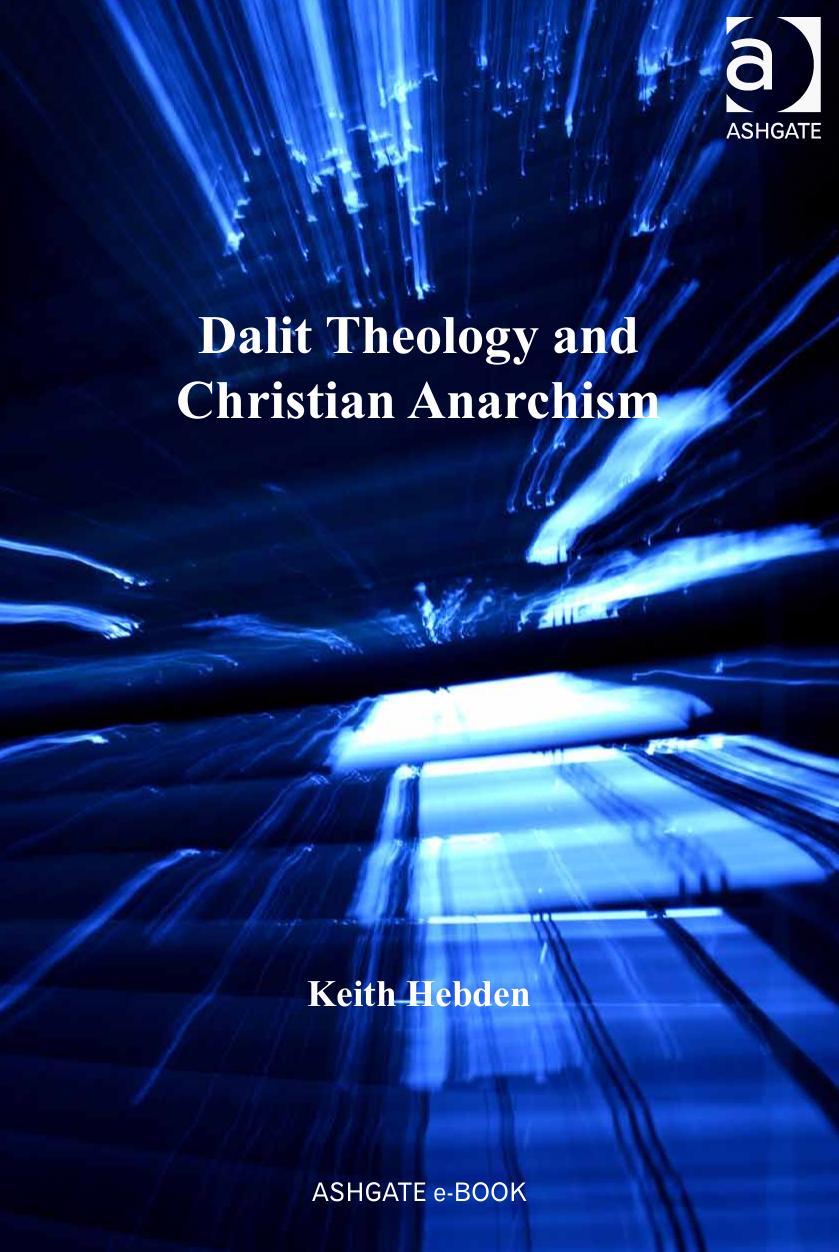Dalit Theology and Christian Anarchism by Hebden Keith

Author:Hebden, Keith.
Language: eng
Format: epub, pdf
Publisher: Ashgate Publishing Ltd.
Published: 2011-03-14T16:00:00+00:00
Ambedkar Parts the Red Sea
Ambedkar rejected Christianity in favour of Buddhism and so did his followers. This means there is a pressure on Dalit theologians to search out what it is about Ambedkar, his life and teachings, so attractive to Dalits. Dalit theology affords Ambedkar uncritical admiration and a prophet-like status. This attention does not reflect the reality of communities: most Dalits have not become Christians, or Ambedkarites. Only a vocal minority have converted at all. Moreover, most Christians ignore both the epithet ‘Dalit’ and the tradition and ideology of Ambedkar. The majority of Dalits have rejected all forms of institutional politics and religion – every statist ideology.
Following Webster’s lead, three Dalit theologians provide the key Christian theological reflections on B.R. Ambedkar: Arvind P. Nirmal, M.E. Prabhakar and P. Arokiadoss. I will conclude with a fourth: Anthony Thumma, who borrows from Arokiadoss the motif of Ambedkar as Moses. Moses is not the archetypal liberator since he is both personally and prophetically violent and oppressive. The people were liberated by a violent God who killed innocent children (the first-born sons of Egypt) to assure their release from captivity and offered them legislation which was exclusive, sexist and oppressive – the Levitical law. Ambedkar, a constitutional father to the Dalits, was as much enthralled of the Western model of state-based social democracy as his high caste peers in politics and, as Thumma points out, considered violence a justified means of fighting the class/caste war. Nonetheless, Ambedkar is the darling of the Dalits and no less so of Dalit theology.
Nirmal draws on Ambedkar’s thought to help define Dalit ‘Pathos’, Prabhakar has tried to prove that Ambedkar’s priorities are essentially liberationist: dignity, justice, equality, freedom, but it is Arokiadoss who provides the most dramatic reading of Ambedkar’s life and work. Ambedkar’s rejection of Christianity and his harsh criticism of it has provided much need fuel for the fire of those within the Churches determined to reform it to a liberationist agenda, such as P. Arokiadoss. A Jesuit priest, Arokiadoss understands Ambedkar as a prophet who should be co-opted into a Christian Dalit understanding of God’s purposes in India: ‘God’s liberating actions became present in Ambedkar’s liberative praxis’,9 comparing him to Moses at the same time. By doing so, Arokiadoss connects Ambedkar with the popular liberationist motif of the Exodus of the Hebrews from Egypt. He celebrates Ambedkar’s revolutionarily overt commitment to the Dalit cause over and above the national interest. In a context beset by competing nationalistic ideologies this is an important difference in approach from Ambedkar and one with practical consequences in his struggle for a separate Dalit electorate. Arokiadoss also draws an exclusively Dalit perspective for ‘doing theology in India’ from Ambedkar’s approach.
There are problems with Arokiadoss’s approach. Firstly, if Ambedkar has rejected Christianity as oppressive then is it honest for Christians to appropriate, posthumously, an Ambedkar as their own. Second, if Ambedkar is the Moses of the Dalits then God’s redemption is no better than that of the state since it too relies on violence.
Download
Dalit Theology and Christian Anarchism by Hebden Keith.pdf
This site does not store any files on its server. We only index and link to content provided by other sites. Please contact the content providers to delete copyright contents if any and email us, we'll remove relevant links or contents immediately.
The Secret Power of Speaking God's Word by Joyce Meyer(3142)
Signature in the Cell: DNA and the Evidence for Intelligent Design by Stephen C. Meyer(3114)
Real Sex by Lauren F. Winner(3000)
The Holy Spirit by Billy Graham(2932)
The Gnostic Gospels by Pagels Elaine(2515)
Jesus by Paul Johnson(2347)
Devil, The by Almond Philip C(2320)
23:27 by H. L. Roberts(2236)
The Nativity by Geza Vermes(2217)
Chosen by God by R. C. Sproul(2148)
All Things New by John Eldredge(2145)
Angels of God: The Bible, the Church and the Heavenly Hosts by Mike Aquilina(1948)
The Return of the Gods by Erich von Daniken(1921)
Angels by Billy Graham(1914)
Knowing God by J.I. Packer(1842)
Jesus of Nazareth by Joseph Ratzinger(1795)
The Gnostic Gospel of St. Thomas by Tau Malachi(1778)
Evidence of the Afterlife by Jeffrey Long(1773)
How To Be Born Again by Billy Graham(1770)
